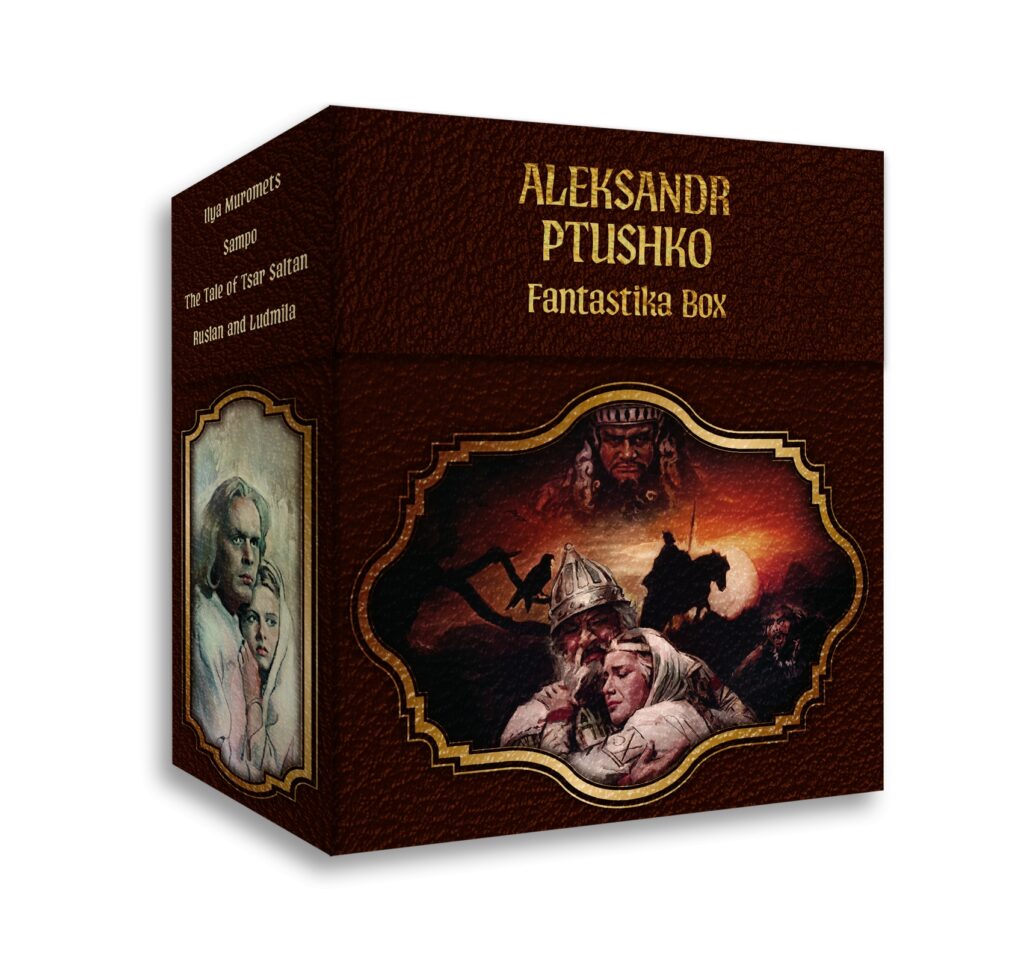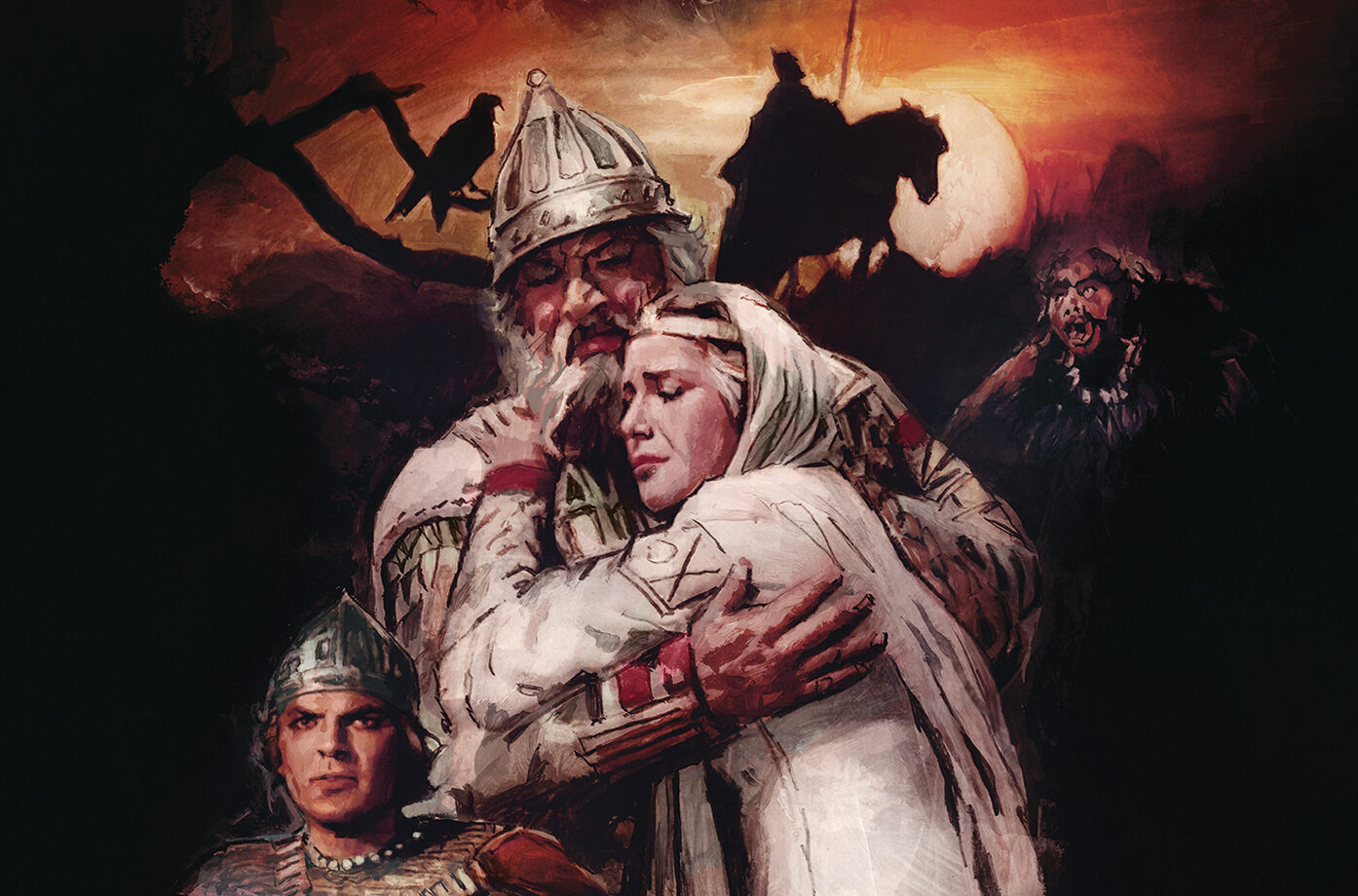Verdict
Summary
Deaf Crocodile’s “Fantastika Box” contains these four outstanding films in a sturdy box set, collecting the films in a way that makes it perfect for collectors to swoop them all up at once. The transfers are all incredible and pitch-perfect, each disc containing a wealth of bonus features. Collectors who are new to these films would do well to take a risk on this set, as all four films are easily some of the best “discoveries” I’ve made in the last year or so. The hard box itself is strong and chunky and not some cheaply slapped together thing that won’t hold up on a collector’s shelf, no: This is top-shelf stuff, and it stands out and will hold up for years.
Ruslan and Ludmila (1972) Plot:
A gallant warrior must prove his worth twice to win his true love.
Review:
Following a victorious battle, a handsome warrior named Ruslan (Valeri Kozinets) is granted a marriage to the fair princess Ludmila (Natalya Petrova) of the kingdom he defended. On their wedding night, Ludmila is literally spirited away through the window, and the king is incensed, calling Ruslan out for allowing this to happen: How dare he! Since the wedding night was not consummated, the king insults Ruslan by offering his daughter – and half of his kingdom – up as a prize to any warrior strong and brave enough to bring her back home. Ruslan is the first to volunteer, but three other men step forward to try their hand and upstage Ruslan. They each scatter to the four winds, hoping to find a trace of the vanished princess. Turns out she was whisked away to the realm of a short wizard named Chernomor (played by little person Vladimir Fyodorov) whose epically long beard is the secret of his power. But Ludmila is clever and uses a helmet of invisibility to continually evade his lustful hands from deflowering her … at least until Ruslan eventually shows up and does battle with the wizard. Before that happens, Ruslan’s quest lands him smack in the middle of an endless wasteland where he encounters a massive severed head of Chernomor’s giant brother, who gives Ruslan a magic sword to vanquish the wizard, which serves both of their quests: One for revenge, the other for honor. When Ruslan chops off the wizard’s beard, he is able to claim his bride once again, but a witch curses them both, which proves disastrous when Ruslan is later slain in battle. But that’s not the end of him, as he’s brought back to life by enchanted water, and must be rid of the witch and the beardless wizard once and for all times.
Based on a Russian fairy tale and filled with colorful and sparkling sets and costumes, Ruslan and Ludmila is epic in length at nearly two-and-a-half hours, but it’s delightfully spry and meant to appeal to children and families, so it’s filled with eye-popping visuals, practical effects and forced perspective shots that show us giants and flying sequences. It feels very much done in the old Hollywood style, hearkening back to the ’40s or even earlier with very stagey acting and acrobatic prancing, but it also has large-scale outdoor battle scenes and sieges with hundreds of horses and soldiers going to war with each other with castle backdrops. If you’re looking for mostly unknown sword and sorcery fantasy films that may have escaped your awareness until now, this one from filmmaker Aleksandr Ptushko, whose final film this was, is impressive. Ptushko was known for his epic fantasy films Viy, Ilya Muromets, and Sampo.
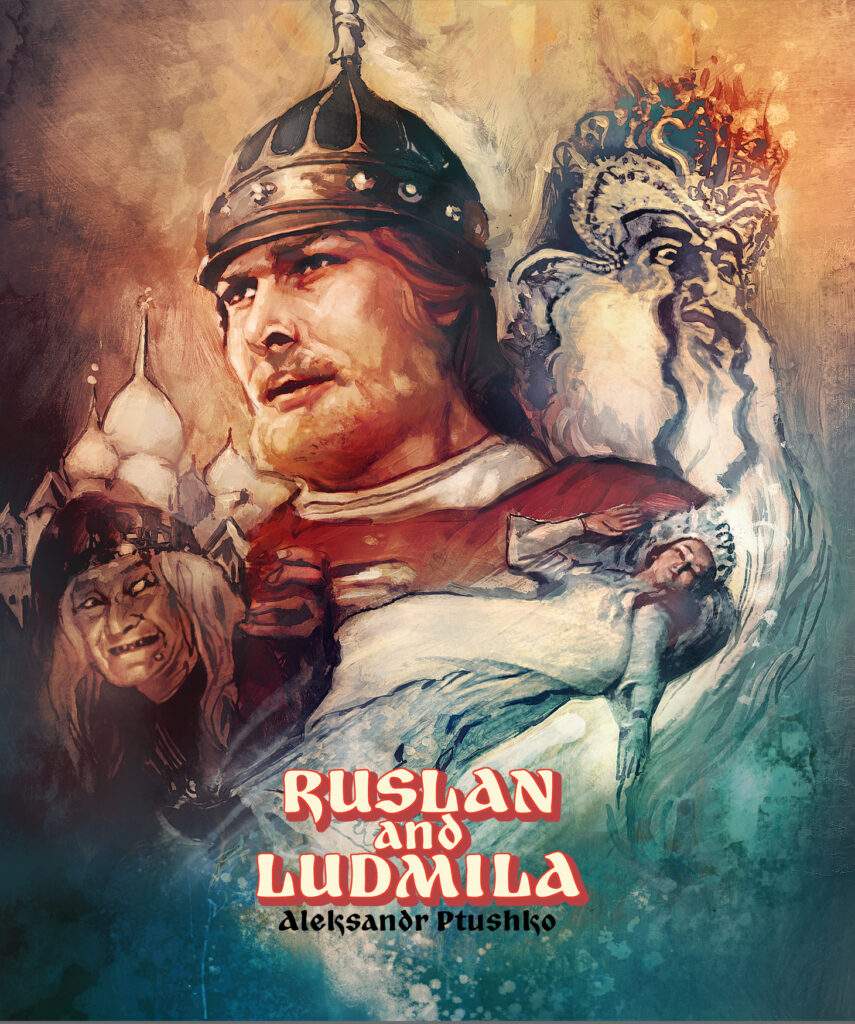
The Tale of Tsar Saltan (1967) Plot:
Witches scheme to dethrone the queen, but her son wins back her place on the throne.
Review:
After waging war against an ogre horde and claiming victory, a Tsar chooses a beautiful young maiden named Tsarina (Larisa Golubkina) to be his bride. She has three envious sisters who cringe that their prettier sibling will thus become the queen, and when the Tsar is off crusading again, they intercept a message intended for her and alter the message and make sure the Tsar’s battalion of soldiers get their message instead: Kill the queen and her just-born child before the Tsar returns home. This message crushes the Tsar’s men because they love Tsarina and her newborn, which is a strapping male child that is growing at an exponential rate with keen intelligence. Instead of simply carrying out the false orders without conscience, the soldiers inform Tsarina of the Tsar’s cruel orders and allow her to choose the method of her death, and she chooses to be encased in an empty wine cask with her son and thrown off a cliff. When she and the boy are tossed away, their cask is eventually transported to a faraway island with an oasis, and by then the boy has grown to manhood. They are able to survive, thanks to a magical swan that is actually an exiled princess who owes her life to him when he uses a bow and arrow to kill a hawk that would’ve killed her. The swan princess helps them leave the island and they eventually make their way back to the grief-stricken Tsar, who is stunned when he encounters his true love Tsarina. Their son becomes a beloved champion, whose very existence is celebrated by a race of sea-borne giants who show themselves now and again to do a good deed for the Tsar.
A sparkling, old-fashioned fairy tale epic with stunning visual effects that combine forced perspective, matte paintings, practical sets, optical illusions, and even puppetry, The Tale of Tsar Saltan isn’t so much a “sword and sorcery” film as it is a dream-like fantasy straight out of a book of bedtime stories, but it’s absolutely gorgeous and fit to be seen by all ages for all time. I really enjoyed this one with its depictions of the ogres (who look like creatures from Star Wars), its perpetual fairy dust aura, and its very innocent way of showing love and affection. Never for one second was I bored, and it felt very much like a classic Hollywood film, though it’s an entirely Russian film, shot during the height of the Cold War, and all the dialogue is delivered in rhyme. Filmmaker Aleksandr Ptushko is best known for his fantasy films Viy and his final epic film Ruslan and Ludmila.
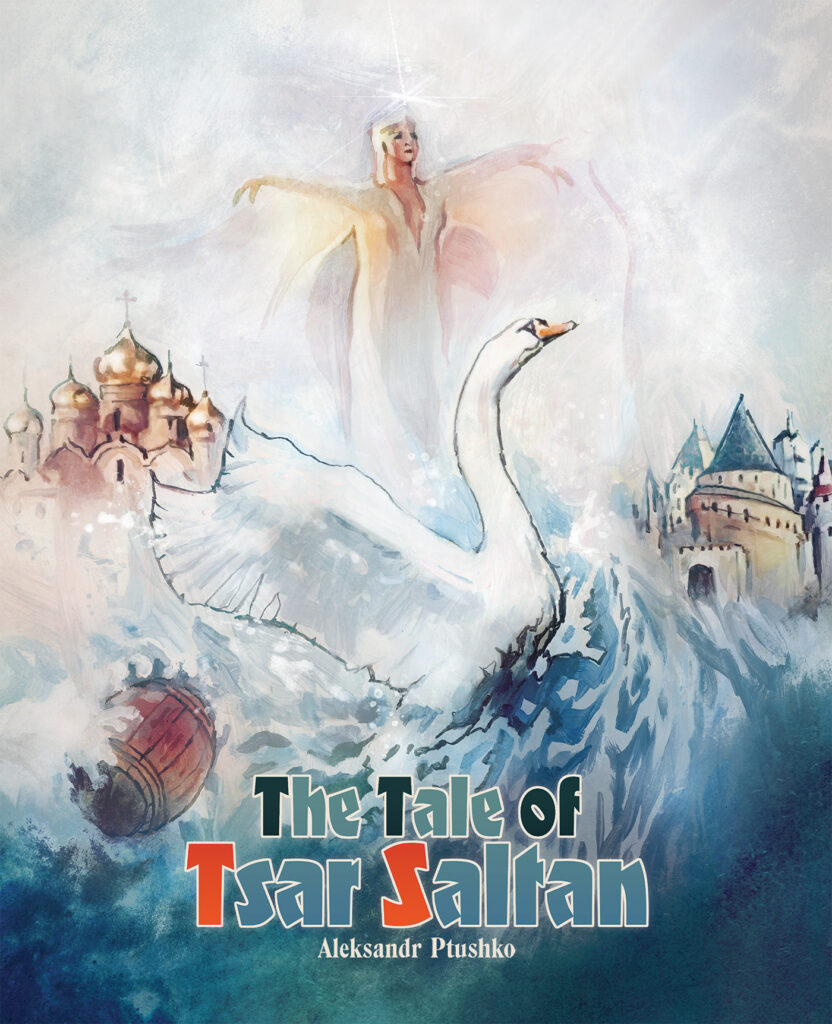
Sampo (1959) Plot:
A witch steals the daughter of a great blacksmith, and tricks him into forging a “sampo” (magical mill) so that the witch and all her minions can have everything they need forever.
Review:
In Finland, a young tree cutter named Lemminkainen (Andris Osins) has a life of productivity ahead of him, as well as the promise to marry the blonde beauty Annikki (Eve Kivi), who is the envy of all the villagers. She will make a fine wife for Lemminkainen, but when an evil witch named Louhi from a mountain across the sea floats into the Lemminkainen’s village, she snatches Annikki away, whisking her back to her mountains where she lords over a demonic clan of hard working slaves who can never satisfy their master’s demand to forge a mystical “Sampo,” a mill that gives resources (grain and gold) aplenty, forever. By taking Annikki, she forces Lemminkainen and his future brother-in-law Ilmarinen, who’s a huge, strapping blacksmith, to come to her mountain to save Annikki, but she won’t just hand the girl over, no: She requires them to forge the Sampo with their sheer force of strength and will. This, they do without trouble, and the mystical mill is created, but they must leave the glorious artifact there, which means their trip home with the girl will be one of both joy and sorrow. When the witch returns again to smite the village with darkness by stealing the sun (during Annikki’s wedding celebrations), Lemminkainen makes one last trip to Louhi’s mountain to steal the Sampo and bring it back to his village as a prize.
Colorful and mystical, Sampo from filmmaker Aleksandr Ptushko is a fantasy film for all ages, with a rather stilted and formal script where characters make pronunciations rather than communicating like normal people would, and the film is all about grand, broad gestures instead of nuances and relatable behavior. One big thing happens, and then there are consequences, and then big, sweeping things happen, and so forth. It’s like a visual storybook come to life, and that’s fine. Ptushko was a master of visuals, and as a Russian fantasy film, this one is pretty good for fans just coming into the subgenre of Nordic fantasy.

Ilya Muromets (a.k.a. The Sword and the Dragon) (1956) Plot:
A warrior’s son is captured as a child by the warrior’s enemy and raised to kill his father in battle.
Review:
Ilya Muromets (Boris Andreyev) will have one epic story to tell one day to his grandchildren if he can weather the storm of years that lie ahead of him. In his prime, his ability to fight in battle is cut short, but then revived when he loses and then regains the use of his legs. His King sends him out to battle the Mongol hordes, and he returns home a victor, having culled a demon that can literally blow armies and villages away with a huff of air. Despite his feats, fate takes a dark turn for Ilya when he’s falsely accused of a crime, leaving his pregnant wife unprotected. She is captured by the Mongol army and gives birth while in prison, but that doesn’t stop the Mongol from trying to make her his own bride while she’s in captivity. Refusing to become his sex slave, she is thrown in a dungeon, while the Mongol leader takes her son and raises him as his own son, trained to one day kill Ilya, his own father. Years pass, and Ilya eventually redeems himself by becoming a free man while fighting the Mongol hordes again, but even better is when he all but single-handedly defeats a three-headed fire-breathing dragon, but his greatest trial will be in fighting his own grown-up son, whom he must convince that they’re father and son.
The first Cinemascope (widescreen) epic from Russia, Ilya Muromets is a visually stunning fantasy film with scores of extras, a lyrical, poetic script, and a good versus evil framework that should still be a crowd pleaser if the crowd happens to be fans of classic fantasy films. The costumes and makeup effects are pretty neat looking, with grand, operatic vistas and hundreds – if not thousands – of extras running across massive open fields while wielding axes, spears, and swords. The dragon is a little disappointing looking, but really what’s to complain about? From Russian fantasy filmmaker Aleksandr Ptushko.
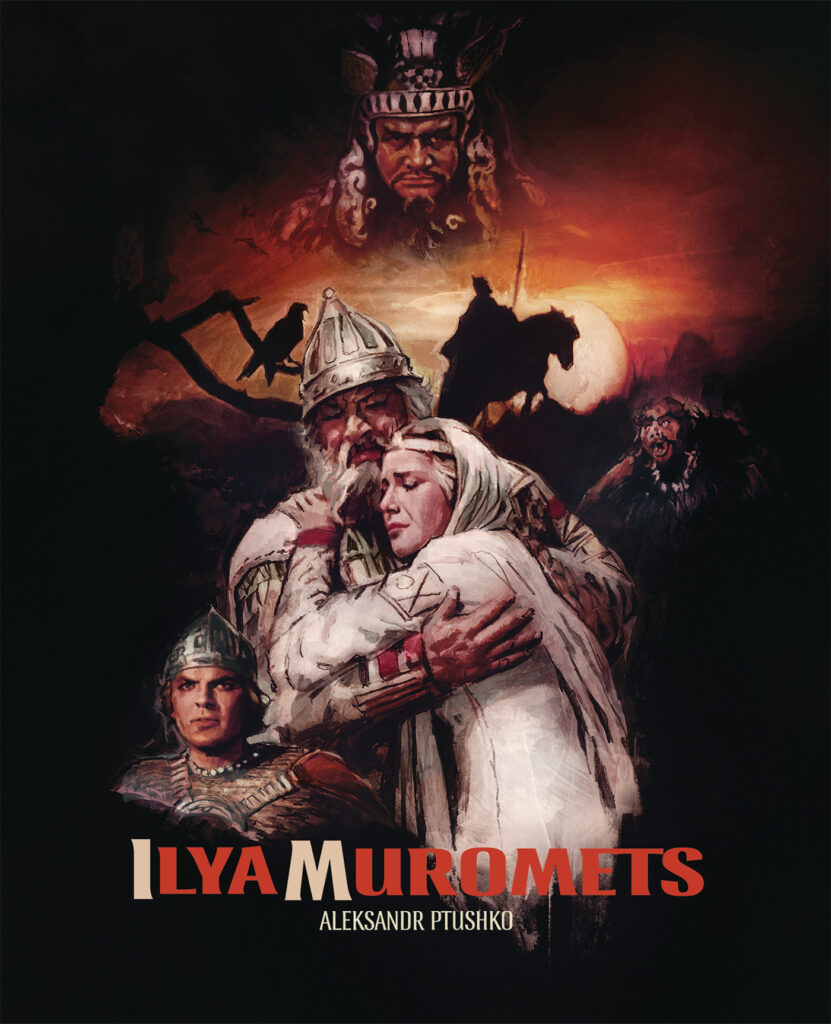
Deaf Crocodile’s “Fantastika Box” contains these four outstanding films in a sturdy box set, collecting the films in a way that makes it perfect for collectors to swoop them all up at once. The transfers are all incredible and pitch-perfect, each disc containing a wealth of bonus features. Collectors who are new to these films would do well to take a risk on this set, as all four films are easily some of the best “discoveries” I’ve made in the last year or so. The hard box itself is strong and chunky and not some cheaply slapped together thing that won’t hold up on a collector’s shelf, no: This is top-shelf stuff, and it stands out and will hold up for years.
- Reprint of Parts 1 and of pioneering Russian film scholar Alan Upchurch’s articles on Ptushko from ‘Video Watchdog’ magazine
- New commentary tracks by comics artist (Swamp Thing) and film historian Stephen R. Bissette.
- New restorations of all four films
- New restoration trailer
- Blu-ray authoring by David Mackenzie of Fidelity In Motion.
- New hour-long video interview with legendary visual effects artist and film historian Robert Skotak (Academy Award-winner, Best Visual Effects for ALIENS and TERMINATOR 2: JUDGMENT DAY) on Aleksandr Ptushko and the history of Soviet fantastika filmmaking.
- New essay by film historian and professor Peter Rollberg (Historical Dictionary of Russian and Soviet Cinema).
- New video essay by film critic Walter Chaw (Film Freak Central).
- Blu-ray artwork by acclaimed artist Tony Stella.
